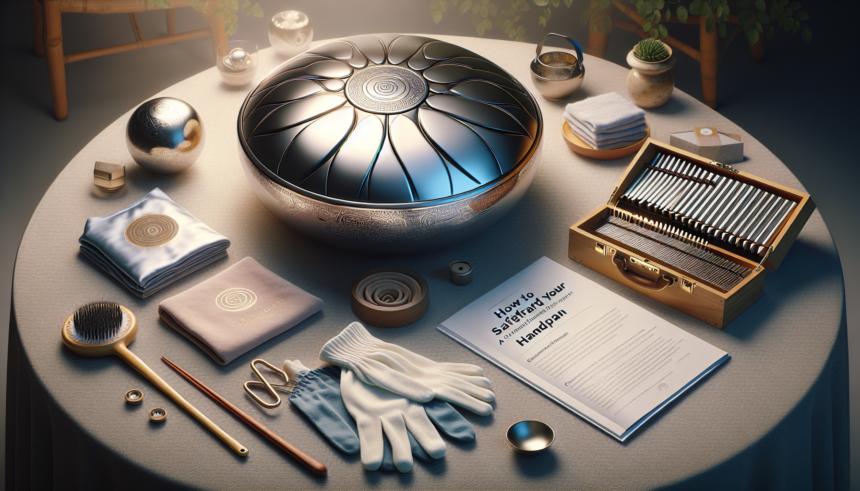The handpan is a unique and enchanting musical instrument with a compelling mix of simplicity and depth. Originating from the Hang, the handpan has quickly gained popularity for its distinctive sound and ease of playing. However, despite its seemingly rugged exterior, the handpan is a delicate instrument requiring proper care and attention. This article covers comprehensive approaches to safeguarding your handpan, ensuring its longevity and sustained performance.
Understanding Your Handpan
Before diving into the mechanics of safeguarding your handpan, it’s crucial to have a basic understanding of the instrument. Handpans are typically constructed from two half-shells of nitrided steel, adhered together to form a hollow, resonant body. They feature dimples on the top shell, which are intricately tuned to produce specific notes. Given the instrument’s construction, its vulnerability lies in its sensitivity to physical damage and environmental factors.
Physical Protection
First and foremost, physical protection is paramount in ensuring your handpan’s longevity.
- Cases and Bags: Investing in a high-quality handpan case or bag is one of the best ways to protect your instrument. Hard cases offer maximum protection against bumps and drops, while soft padded bags are ideal for less rigorous transport.
- Placement: When not playing, place your handpan on a soft, stable surface. Avoid placing it near edges or on unstable furniture where it could fall. Using a handpan stand can also keep it safe and accessible.
- Handling: Always handle your handpan with both hands, supporting it from beneath. Avoid using sharp objects around the instrument and never place heavy objects on top of it.
Environmental Considerations
Environmental factors play a significant role in maintaining your handpan’s condition. Here are some key areas to monitor:
- Humidity and Temperature: Extreme fluctuations in humidity and temperature can affect the metal’s integrity and tuning. Store your handpan in a controlled environment, avoiding damp or extremely dry conditions. Using a hygrometer helps monitor humidity levels, ideally maintaining them between 40-60%.
- Sunlight Exposure: Prolonged exposure to direct sunlight can cause thermal expansion, leading to detuning or even damage. Always keep your handpan away from direct sunlight and fluorescent lighting to prevent harmful UV exposure.
Cleaning and Maintenance
Regular cleaning and maintenance are essential in preserving the sound quality and appearance of your handpan.
- Regular Cleaning: Wipe down your handpan with a microfiber cloth after each use to remove fingerprints, oils, and moisture. For a more thorough cleaning, use a gentle soap solution and rinse with lukewarm water, ensuring to dry it thoroughly afterward.
- Rust Prevention: Rust is a common enemy of steel handpans. Applying a protective oil like Phoenix Oil or Froglube can create a barrier against moisture. Make sure to wipe off any excess oil to prevent residue buildup.
- Annual Tune-ups: As with any musical instrument, your handpan might need occasional retuning. Consulting with a skilled tuner annually ensures the instrument maintains its pitch and timbre.
Transportation Tips
Transporting your handpan requires extra care to avoid damage.
- Use Proper Cases: As mentioned, a decent hard case or padded bag is essential when traveling with your handpan. Ensure the case has sufficient padding and fits snugly to avoid movement inside.
- Secure Placement: In a vehicle, position your handpan in a secure spot where it won’t roll or shift during transit. If flying, contact airlines in advance to understand their policies on musical instruments and always aim to carry your handpan as hand luggage.
- Avoid Extreme Environments: Do not leave your handpan in a car trunk or exposed to harsh weather conditions for extended periods.
Insuring Your Handpan
Given the financial investment, insuring your handpan can provide peace of mind. Musical instrument insurance policies are designed to cover potential damages during transit, theft, and other unforeseen occurrences. Research various insurance providers to find a policy that suits your needs, ensuring comprehensive coverage.
Playing Techniques to Preserve Tuning
Your playing style can significantly impact your handpan’s tuning and longevity. Here are some tips to consider:
- Light Touch: Striking the handpan gently but firmly is essential. Overly aggressive playing can distort the dimples and detune the instrument.
- Avoiding Sharp Objects: Ensure your fingers are free of sharp objects like rings or nails that can scratch or dent the surface.
- Use of Surrounding Equipment: Employing a dedicated handpan stand can minimize contact with foreign objects, reducing the likelihood of inadvertent damage.
Conclusion
Safeguarding your handpan involves a mix of preventative measures, proper handling, and regular maintenance. By understanding the environmental factors, employing physical protection, and maintaining routine cleaning and tune-ups, you can ensure your handpan remains in pristine condition. This unique instrument, with its enchanting sounds, deserves the utmost care. By taking the steps outlined in this guide, you can enjoy its ethereal tones for years to come.
Frequently Asked Questions (FAQs)
1. How often should I apply oil to my handpan?
It is recommended to apply protective oil to your handpan every 2 to 4 weeks, depending on the climate and usage. Regular oiling helps prevent rust and keeps the instrument in good condition.
2. Can I leave my handpan in the car overnight?
It is not advisable to leave your handpan in a car overnight. The temperature fluctuations and potential exposure to humidity can cause significant damage to the instrument.
3. What should I do if my handpan gets wet?
If your handpan gets wet, immediately dry it thoroughly with a soft cloth. Ensure no moisture is left on the surface to prevent rust formation. After drying, consider applying a layer of protective oil.
4. How can I tell if my handpan has lost its tuning?
If you notice a change in the clarity or pitch of the notes, or if certain notes sound “off,” your handpan might need retuning. Consulting with a professional tuner can help diagnose and correct the issue.
5. Are there specific brands of cases recommended for handpans?
Several reputable brands make high-quality cases for handpans, including Evatek and Hardcase Technologies. These cases offer excellent protection and sturdy construction, ensuring your handpan is safe during transport.





